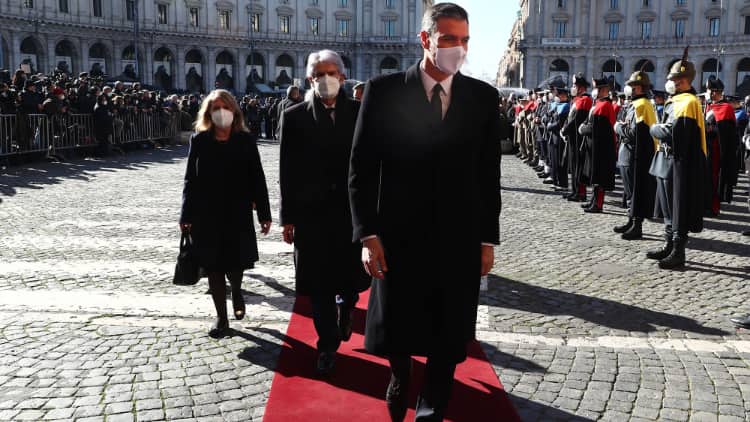Ángel Collado
Pedro Sánchez’s willingness to fulfil Spain’s obligations as a NATO partner opens a new crisis in the coalition cabinet as the communist sector of the cabinet opposes the government’s defence of Ukraine in the face of Russia’s threats of invasion.
Moreover, Podemos is mobilising the bloc of left-wing pro-independence groups (Catalan, Basque and Galician) that support the head of the Executive in power, in a sort of anti-Atlantic front that could force him to require the parliamentary support of the opposition.
The far-left parties, separatists included, that brought Sánchez to government in June 2018 have one thing in common besides their rejection of the constitutional regime: opposition to NATO and everything it represents.
With the exception of the PNV, the PSOE’s allies have their sympathies abroad in the dictatorial or populist regimes of Latin America (Cuba and Venezuela) or, as in the case of the Catalan separatists, have even cultivated relations with Russia in order to garner support for Catalonia’s secession.
Despite having five ministers in the Cabinet, Podemos and its satellite parties such as Izquierda Unida and the Communist Party, defend a foreign policy contrary to that defined by Pedro Sánchez through his Defence Minister, Margarita Robles, of solidarity with NATO in the conflict opened by Russia. And in the form of a manifesto, they have added Bildu (heir to the political arm of ETA), the Catalan anti-system CUP, the Galician separatists of the BNG and other regional left-wing formations to their campaign against the Atlantic Alliance.
Robles has brought forward the sending of ships and the offer of more air forces to the area within the NATO mechanism to make clear the commitment of Spain, a country that will host the NATO assembly in June. Sánchez wants to relaunch his image in foreign policy, which is at a low ebb after the snubs from Joe Biden, whom he is preparing to receive in Madrid at the Atlantic summit.
Robles is paving the way, committed to pursuing a state defence policy, unopposed by the PP, in which she strives to fulfil all commitments in missions abroad, and also to maintain investment in arms modernisation. Spain has the distinction of being the country that invests the least in defence as a percentage of its Gross Domestic Product, barely 1.1 per cent, compared to the NATO target of 2 per cent.
But while Sánchez wants to make himself look good with the Atlantic Alliance meeting in Spain this year, his partners and allies prefer to sign up to pacifist populism and support Putin’s arguments.
Podemitas and pro-independence supporters reject the idea that Ukraine and Georgia could benefit from NATO’s defence umbrella, aspirations that they attribute to US interests, and oppose sending Spanish troops to the Black Sea or Bulgaria, which the government of which they form part or which they support in parliament is considering.
Podemos is already preemptively reprising the ‘no to war’ message with which the entire Spanish left, with the PSOE at the forefront, launched itself against the PP government under José María Aznar for its decision to send troops to Iraq in 2003 as part of the US-led coalition. Now it is a Podemos minister, Irene Montero, who is waving the banner against her president’s plans.
Without his Podemos partners and regular allies on the left, Sánchez lacks a majority to pass anything in Congress, including a possible deployment of troops on any foreign mission. However, if it comes to that, Spain’s role in NATO would not be jeopardised by the Popular Party’s commitment to the country’s responsibilities in Western defence and security. The PP’s MPs outnumber those of the government allies.
The problem for Sánchez would be having to explain himself to the head of the opposition, Pablo Casado, and accept his support on a question of state amidst the shunning or opposition of his partners.







